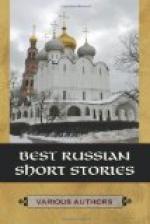So, in a certain department there was a certain official—not a very notable one, it must be allowed—short of stature, somewhat pock-marked, red-haired, and mole-eyed, with a bald forehead, wrinkled cheeks, and a complexion of the kind known as sanguine. The St. Petersburg climate was responsible for this. As for his official rank—with us Russians the rank comes first—he was what is called a perpetual titular councillor, over which, as is well known, some writers make merry and crack their jokes, obeying the praiseworthy custom of attacking those who cannot bite back.
His family name was Bashmachkin. This name is evidently derived from bashmak (shoe); but, when, at what time, and in what manner, is not known. His father and grandfather, and all the Bashmachkins, always wore boots, which were resoled two or three times a year. His name was Akaky Akakiyevich. It may strike the reader as rather singular and far-fetched; but he may rest assured that it was by no means far-fetched, and that the circumstances were such that it would have been impossible to give him any other.
This was how it came about.
Akaky Akakiyevich was born, if my memory fails me not, in the evening on the 23rd of March. His mother, the wife of a Government official, and a very fine woman, made all due arrangements for having the child baptised. She was lying on the bed opposite the door; on her right stood the godfather, Ivan Ivanovich Eroshkin, a most estimable man, who served as the head clerk of the senate; and the godmother, Arina Semyonovna Bielobrinshkova, the wife of an officer of the quarter, and a woman of rare virtues. They offered the mother her choice of three names, Mokiya, Sossiya, or that the child should be called after the martyr Khozdazat. “No,” said the good woman, “all those names are poor.” In order to please her, they opened the calendar at another place; three more names appeared, Triphily, Dula, and Varakhasy. “This is awful,” said the old woman. “What names! I truly never heard the like. I might have put up with Varadat or Varukh, but not Triphily and Varakhasy!” They turned to another page and found Pavsikakhy and Vakhtisy. “Now I see,” said the old woman, “that it is plainly fate. And since such is the case, it will be better to name him after his father. His father’s name was Akaky, so let his son’s name be Akaky too.” In this manner he became Akaky Akakiyevich. They christened the child, whereat he wept, and made a grimace, as though he foresaw that he was to be a titular councillor.
In this manner did it all come about. We have mentioned it in order that the reader might see for himself that it was a case of necessity, and that it was utterly impossible to give him any other name.




